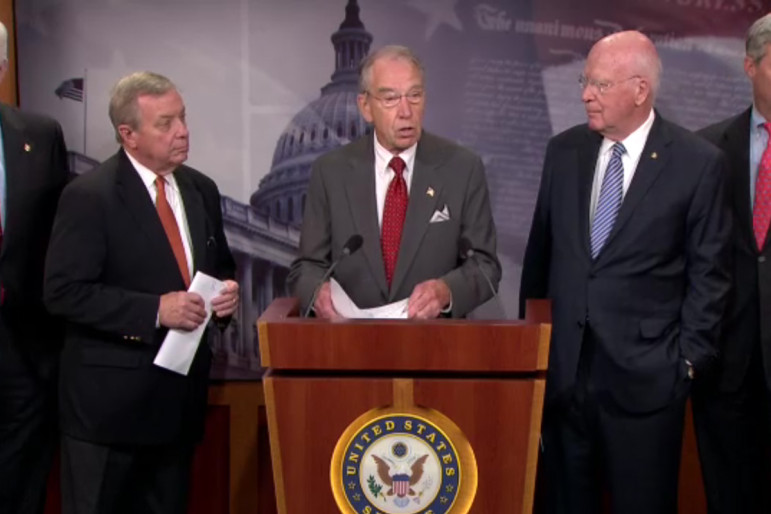
From left to right: Sens. Dick Durbin, D-Ill.; Charles Grassley, R-Iowa, and Patrick Leahy, D-Vt., spoke today announcing the bipartisan Sentencing Reform and Corrections Act.
WASHINGTON — A bipartisan group of senators today unveiled a criminal justice reform bill that includes provisions to help juveniles during and after their incarceration.
The Sentencing Reform and Corrections Act of 2015 would change parole, expungement and solitary confinement policies for juveniles in the federal system as part of a broader package of sentencing and prison reforms for adults.
Sen. Cory Booker, D-N.J., a co-sponsor of the legislation who has championed an end to solitary confinement for juveniles, called the bill a comprehensive effort, in part because it doesn’t neglect young offenders.
“It focuses on our children who are too often forgotten in these discussions of criminal justice reform,” he said at a press conference.
The bill would limit the use of solitary confinement for juveniles in federal prison. It also would permit nonviolent offenders who are tried as juveniles in federal court to seek to seal or expunge their records in some circumstances, according to a summary of the bill’s provisions.
“The goal is to enable youthful offenders who live a crime free life to seek employment without regard to earlier errors in their life,” the summary said.
The bill also would allow juveniles convicted as adults in the federal system to seek parole before a judge after they have served 20 years of their sentence. The judge would consider specific factors to decide whether parole was merited. If denied, an inmate could apply twice more after a waiting period of five years, according to the summary.
[Related: JJDPA Could Clear Way for Other Juvenile Justice Reforms]
“Those people will be able to demonstrate that they’re not the same child they were when they committed the crime,” said James Dold, advocacy director at the Campaign for the Fair Sentencing of Youth.
The provisions would apply retroactively to all juveniles charged as adults, including those given life sentences, Dold said. In this case, judges would be modifying their original sentence, not granting parole.
The Supreme Court ruled in 2012 that mandatory life without parole sentences for juveniles are unconstitutional. Fourteen states have banned life-without-parole sentences for children, including nine during the last three years.
Dold said the provision is a continuation of a trend toward recognizing children and adolescents differ from adults because their brains are still developing.
The bill is the result of months of wrangling among a small group of senators, including Sen. Chuck Grassley, R-Iowa, chairman of the Judiciary Committee. Grassley’s support is considered key to the bill’s momentum.
Naomi Smoot, senior policy associate at the Coalition for Juvenile Justice, said the bill is complementary to the Juvenile Justice and Delinquency Prevention Reauthorization Act. The legislation cleared the Senate Judiciary committee this summer and could reach the Senate floor in the coming weeks.
“We would love to see the movement toward reform for juveniles continue. I think this bill and JJDPA show us there is a bipartisan consensus on this front: Our kids deserve better,” she said.
The bill’s other sponsors are Sens. John Cornyn, R-Texas; Sheldon Whitehouse, D-R.I.; Mike Lee, R-Utah; Charles Schumer, D-N.Y.; Lindsey Graham, R-S.C., and Patrick Leahy, D-Vt.
The bill’s introduction comes in a week of national announcements related to juvenile justice.
Education Secretary Arne Duncan gave a high-profile speech Wednesday about ending the school-to-prison pipeline, calling for states and localities to reinvest money now used to pay to incarcerate nonviolent offenders for paying teachers.
In addition, President Obama issued a presidential proclamation making October as National Youth Justice Awareness Month.
“This month, we rededicate ourselves to preventing youth from entering the juvenile and criminal justice systems and recommit to building a country where all our daughters and sons can grow, flourish, and take our Nation to new and greater heights,” the proclamation said.
This story has been updated.
More related articles:
House Proposal Would Eliminate Key JJDPA Funding
Will This Be the Year JJDPA Is Reauthorized?
Senate Judiciary Committee Approves JJDPA Update
it is time to change the juvenile law, i cant understand that grown adult who go into prison come in and out over and over and a juvenile dont even get a second chance in life and i also believe that we “A WESTERN SOCIETY” dont like children at all if we did they would not sit in prison for 20-30 years and a life time it is inhumane.
miss griffin